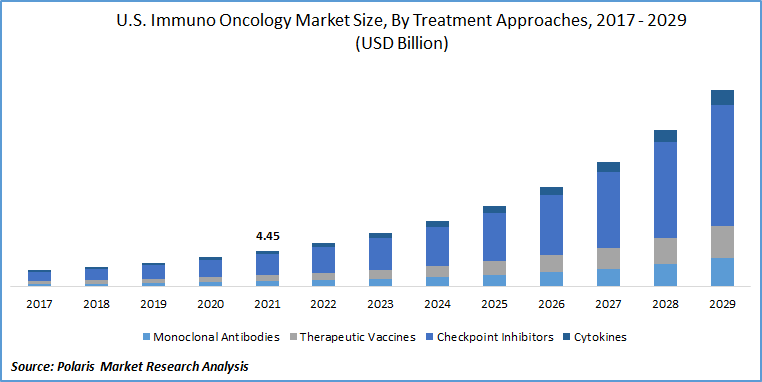
Immuno Oncology (IO) Market Share, Size, Trends, Industry Analysis Report By Treatment Approaches; By Novel Targets (IDO1i, LAG-3 CPI, oncolytic virus, STING agonist, TLR agonist, HDACi, TIL, VEGFi, MEKi, TIGIT, CPI, GITR agonist, TGF-b trap, A2AR antagonist/CD73i); By Tumor Type; By Region, Segment Forecast, 2022 - 2029
- Published Date:Jan-2022
- Pages: 101
- Format: PDF
- Report ID: PM1083
- Base Year: 2020
- Historical Data: 2017 - 2020
Report Summary
The global immuno oncology (IO) market size was valued at USD 17.56 billion in 2021 and is expected to grow at a CAGR of 23.4% during the forecast period. Innovative technologies along with increased spending on research & development by key market players for better treatment are some factors driving the global immuno oncology (IO) market growth.

Know more about this report: request for sample pages
I-O therapies are a new type of cancer therapy that uses the individual’s own immune system to combat illness. The therapy improves the immune system to find and destroy cancer cells by using molecules manufactured within the body or in a lab. A shift in the treatment of conventional chemotherapies to immuno oncology therapies is anticipated to propel the immuno oncology (IO) market growth over the forecast period.
Industry Dynamics
Growth Drivers
The fast discovery of I-O treatments for a variety of cancers has changed the scene of cancer therapy and improved the long-term prospects for many progressed cancer patients, which has increased the demand for immuno oncology (IO). Furthermore, increasing investment by the government and several pharmaceutical companies in research & development for treating cancer is expected to drive the immuno oncology (IO) market over the forecast period. However, huge cost as compared to radiotherapy and chemotherapy along with various challenges in clinical trials is expected to restrain the immuno oncology (IO) industry growth over the forecast period.
Report Segmentation
The global immuno-oncology market is segmented on the basis of treatment approaches, novel targets, tumor type, and region.
By Treatment Approaches |
By Novel Targets |
By Tumor Types |
By Region |
|
|
|
|
Know more about this report: request for sample pages
Insight by Treatment Approaches
Checkpoint inhibitors held the largest market share in 2021 and are expected to dominate the treatment approaches segment over the forecast period. These inhibitors block checkpoint proteins to connect with their companion proteins which allow T cells to destroy cancer cells. Increasing public awareness along with technology innovation are the key factors driving the segment growth.
Geographic Overview
North America dominated the global (IO) market in 2021 and is expected to maintain its dominance over the forecast period due to the rising geriatric population coupled with developed healthcare infrastructure. Moreover, increasing cancer cases along with the presence of key market players in this region is expected to create lucrative opportunities for the immuno oncology (IO) market to grow.
Asia Pacific region is anticipated to grow at a significant pace over the forecast period due to increasing cancer cases along with the rapidly improving pharmaceutical and healthcare industry. Furthermore, increasing investment from private and government organizations is expected to create lucrative opportunities for immuno oncology (IO) market growth.
Competitive Landscape
Some of the players operating in the global market include Amgen, Inc., AstraZeneca, Bristol Myers Squibb, Celgene Corporation, Eli Lilly and Company, F. Hoffmann-La Roche AG, GlaxoSmithKline Plc., Incyte, Janssen Biotech, Inc., Merck, Novartis AG, Pfizer, Roche, Sanofi, Spectrum Pharmaceuticals and Takeda Pharmaceuticals.
Immuno Oncology (IO) Market Report Scope
|
Report Attributes |
Details |
|
Market size value in 2021 |
USD 17.56 billion |
|
Revenue forecast in 2029 |
USD 92.71 billion |
|
CAGR |
23.4% from 2022 - 2029 |
|
Base year |
2021 |
|
Historical data |
2017 - 2020 |
|
Forecast period |
2022 - 2029 |
|
Quantitative units |
Revenue in USD million/billion and CAGR from 2022 to 2029 |
|
Segments covered |
By Treatment Approaches, By Novel Targets, By Tumor Types, By Region |
|
Regional scope |
North America, Europe, Asia Pacific, Latin America, Middle East & Africa |
|
Key Companies |
Amgen, Inc., AstraZeneca, Bristol Myers Squibb, Celgene Corporation, Eli Lilly and Company, F. Hoffmann-La Roche AG, GlaxoSmithKline Plc., Incyte, Janssen Biotech, Inc., Merck, Novartis AG, Pfizer, Roche, Sanofi, Spectrum Pharmaceuticals and Takeda Pharmaceuticals. |
License and Pricing
Purchase Report Sections
- Regional analysis
- Segmentation analysis
- Industry outlook
- Competitive landscape
Connect with experts
Suggested Report
- Wireless In-flight Entertainment (W-IFE) Market Research Report, Size & Forecast, 2017 – 2026
- Whiskey Market Share, Size, Trends, Industry Analysis Report, 2022 - 2030
- Bone Grafts and Substitutes Market Size, Share & Trends Analysis Report, 2021-2028
- Seed Treatment Market Share, Size, Trends, Industry Analysis Report, 2022 - 2030
- Clinical Trial Kits Market Share, Size, Trends, Industry Analysis Report, 2022 - 2030

